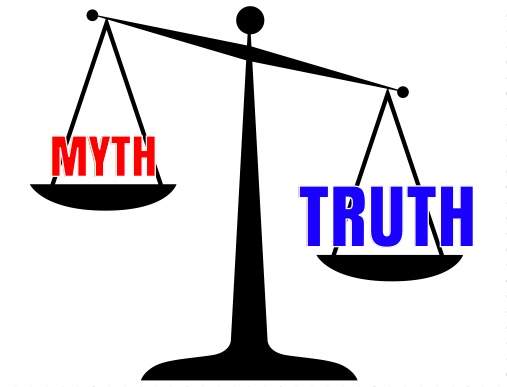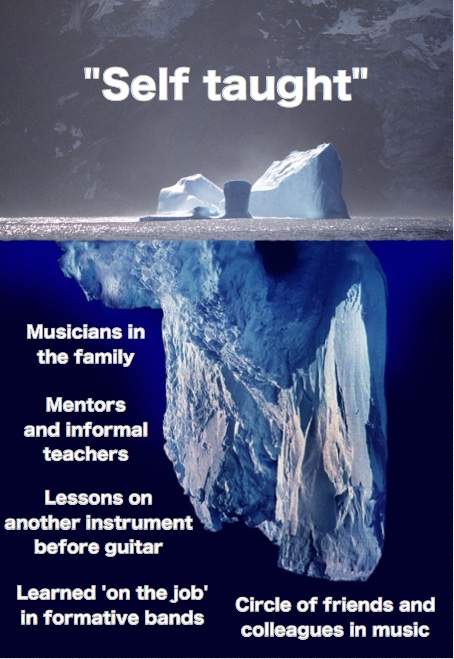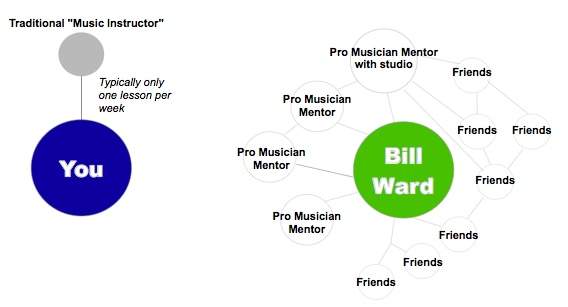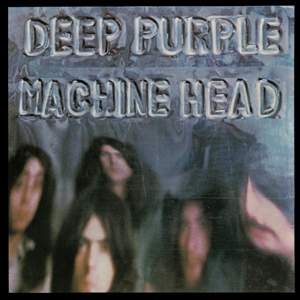
Myth (noun):
A widely held but false belief or idea;
A misrepresentation of the truth;
An exaggerated or idealised conception of a person or thing.
Today we’re going to explore the popular belief that most rock musicians were self taught on their instruments. Is it true?
Here is a classic example of the answer we usually get when someone asks a famous rock musician the question, “Did you take lessons?”.
In a recent interview, Bill Ward, drummer of the mighty Black Sabbath, answers:
“I was self taught. I didn’t take any lessons.”
The answer to the question of having lessons is usually a “no” like this, especially from the great musicians of this generation.
Wow, you think. Damn. So he worked out how to play the instrument by himself. Self-taught huh. All these great players… I keep hearing they worked it all out themselves. Damn. Guess it must be just natural talent or something.
That’s the headline answer, and that’s what 99% of people remember and go away believing (and spreading around in conversation with others).
But that’s far from the whole story.
Bill Ward continues to describe what he was actually doing as a teenager trying to learn drums:
“But I’ll tell you what, I was around a lot of drummers.”
He proceeds to talk about several local professional drummers he knew at the time (including the drummer from Jethro Tull) who he would go and see all the time and sit beside on stage, watching and learning from everything they did.
Then he mentions another drummer, this time who owned a drum shop, and that he met him at his shop “every day” for years.
“These guys were all my teachers. I had a lot of teachers.”
A lot of teachers? Cool, but this is starting to sound a bit different from “self-taught”, isn’t it?
He continues to describe how, at the shop, that actually, all the serious young drummers from the area would congregate around there in groups of 7 or 8 at a time and exchange tips:
“We would all play and show each other what we had learned… it was like a Drum Workshop.”
Drum workshops? But I thought he didn’t take lessons. He even mentions someone working on ‘triplets’ – a drum rudiment, and the formal musical term for three evenly spaced hits in the space of a beat. Where’d he learn terms like that?
Finally, in the same breath it slips out that John Bonham from Led Zeppelin (who is similarly ‘self-taught’) was also a part of this drumming circle at the time. They knew each other and were good friends.
Ok, let’s pause for a second. We started with “self-taught, didn’t take any lessons”, and ended up more like:
“Actually… I got to know loads of pro drummers, hung out at a drum studio every day, took part in workshops and informal group lessons for years, and had a tight circle of musical friends to exchange tips and advice with on a daily basis (among them the future drummer of LED ZEP!)”.
That’s a drastically different picture from someone sitting around at home trying to work out how to play a musical instrument by themselves — which would be the true meaning of “self-taught” — isn’t it?
Instead, we get a picture of a very dedicated person who was doing everything he possibly could to work on his playing and increase his musical education with whatever opportunities he could find to learn from others.
When rock musician say they’re self-taught, didn’t have a teacher, and/or didn’t take lessons, this is a perfect example of what it actually means. They almost always had several teachers and/or mentor figures, and had a circle of peers and colleagues around them sharing knowledge, tips, and advice, and showing them things along the way to help them get better.
Bill Ward from Black Sabbath is the example here, but it could easily have been Jimi Hendrix, or Eddie Van Halen, Yngwie Malmsteen, or whoever else has been shrouded in this ‘self-taught’ mythology. There is always a backstory that most people don’t know, and it always goes something like this.

They surrounded themselves with like-minded people doing what they wanted to do, and, on an ongoing basis, learned everything they could from them.
Formal lessons, in the sense of having a private tutor and taking grades, and the ‘traditional’ image you might picture? Maybe not.
Learning tonnes of things about music and how to play, from supportive people who were a lot more experienced than them at the time? Definitely.
Isn’t that the definition of ‘having a teacher’?
It is, and Bill said so himself: “I had a lot of teachers”.
So let’s clarify: Saying that a musician did have teachers, yet did not have lessons, doesn’t make a whole lot of sense — for what else were they receiving from those teachers, if not lessons?
“Informal” lessons are still lessons.
In fact, when we compare Bill Ward’s “informal” lessons with his teachers, to the traditional idea of sitting alone with an instructor for one lesson once a week, don’t you think we could fairly say that people like Bill actually had, not only a lot MORE lessons, but also FAR SUPERIOR music lessons than the average person?

This is an important thing to understand and see correctly, because if you want to get good at an instrument like guitar you need to realise that the great musicians who inspire you aren’t some kind of different species, and that you too can learn to be a great player.
Having the incorrect belief that music skills have to be natural, in-built, gifted to you at birth, or anything like that, rather than gained and developed over time, is one of the fastest ways to lose any motivation to practice and improve.
Unfortunately, this damaging belief has been spread around for a long time by people who don’t understand how this process works; proclaiming that such and such famous musicians were ‘self-taught’, when in reality they had lots of teachers and an extensive informal musical education.
When people want to know if a rock musician had lessons, they’re basically asking: “Did this musician really work it all out themselves, which I can’t imagine doing myself, or did they have any help or instruction to get that good, like I need?”
And the real answer you find after enough digging is always, just like it was here, that YES they did have help — a lot more than you probably think, and certainly a lot more than they often imply when they casually answer questions.
Part of what perpetuates the myth is the way in which questions are phrased to musicians, which can very often lead immediately to incomplete and/or misleading headline answers. For example, the initial question in this interview was phrased as:
“Did you take lessons or were you self-taught”?
Notice how this is pre-framing the answer to the question and putting words into someone’s mouth, as if the answer can only be one of the two vaguely defined options of “lessons” or “self-taught”.
You can see if you read between the lines from the expanded account Bill Ward generously provides, that the real answer is not only more subtle than this, but an awful lot closer in reality to the former than the latter.
Bill Ward did explain how he actually learned, but most people don’t read between the lines (or even past the headline).
Remember this example, and take it with a pinch of salt the next time you hear a headline or somebody telling you that a great rock musician was “self-taught” or “didn’t have any lessons”. It’s never the true picture.
Nobody becomes great at music by sitting alone in a vacuum without any help.
And nor will you.
– Christy
Bill Ward Interview excerpt and full link: https://www.ultimate-guitar.com/news/general_music_news/black_sabbaths_bill_ward_i_never_took_drum_lessons_im_self-taught.html




